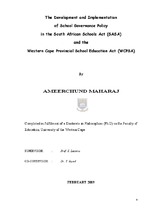| dc.contributor.advisor | Lazarus, S | |
| dc.contributor.advisor | Sayed, Y | |
| dc.contributor.author | Maharaj, Ameerchund | |
| dc.contributor.other | | |
| dc.contributor.other | Faculty of Education | |
| dc.date.accessioned | 2013-07-18T09:44:54Z | |
| dc.date.available | 2007/04/20 09:59 | |
| dc.date.available | 2007/04/20 | |
| dc.date.available | 2013-07-18T09:44:54Z | |
| dc.date.issued | 2005 | |
| dc.identifier.uri | http://hdl.handle.net/11394/1678 | |
| dc.description | Philosophiae Doctor - PhD | en_US |
| dc.description.abstract | The study was concentrated on the period following the first democratic elections for a new government in South Africa, that is, post -1994 up to the year 2000. The change from a system based on fixed apartheid ideology to a more open and democratic one meant that the political scene became more characterized by fierce competition and volatility. The aim of the research was to understand the nature of the contestation as it manifests itself in both the development and implementation of school governance policy at national, provincial and local levels in a climate of political change and turbulence. | en_US |
| dc.language.iso | en | en_US |
| dc.publisher | University of the Western Cape | en_US |
| dc.subject | South Africa | en_US |
| dc.subject | National Education Policy Act 1996 | en_US |
| dc.subject | School management and organization | en_US |
| dc.subject | Education and state | en_US |
| dc.subject | Educational change | en_US |
| dc.title | The development and implementation of school governance policy in South African Schools Act (SASA) and the Western Cape Provincial School Education Act (WCPSA) | en_US |
| dc.type | Thesis | en_US |
| dc.rights.holder | University of the Western Cape | en_US |
| dc.description.country | South Africa | |

